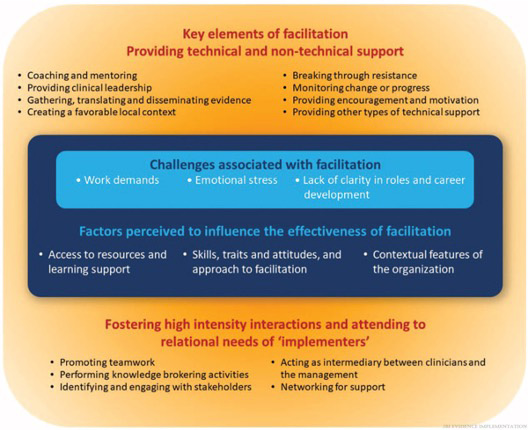
Insights from Evidence Implementation Practices
Effective Facilitation
A recent qualitative systematic review provides valuable insights into facilitation within evidence implementation. Drawing from facilitators' experiences, it uncovers crucial elements, influencing factors, and challenges inherent in this process.
The study emphasises that effective facilitation encompasses more than technical aid; it involves establishing robust relationships and collaborations among health professionals. Success relies on factors like resource accessibility, learning support, facilitator traits, approach, and the organisational context.
Aligned with quantitative studies, the review identifies a spectrum of activities pivotal for driving changes in clinical practice. Beyond technical assistance, it highlights the significance of relational awareness, showcasing the pivotal role relationships play in evidence implementation. Tailoring support activities and collaborations to suit different implementation phases and staff needs emerges as a key strategy for optimal outcomes.
Facilitation's dynamic nature requires varying levels of resources and support throughout different implementation stages. Ranging from coaching to fostering teamwork, these multifaceted support elements span various implementation phases, demanding adaptable application based on staff requirements.
Given the complexity of facilitation, adopting a team approach proves essential, amalgamating diverse experiences and specialised skills. Encouraging investment in training and developing staff, particularly those new to facilitation, bolsters internal facilitation capabilities. Initiatives aimed at enhancing the skills of implementation support practitioners leverage existing resources effectively.
Facilitators encounter challenges such as role clarity and career development pathways, prompting proactive strategies. Allocating dedicated time underscores the importance of facilitation, while structured roles and teamwork mitigate frustration and foster adaptability. Establishing supportive organisational conditions, fostering positive attitudes toward innovation, and engaging staff are crucial for successful facilitation.

This qualitative systematic review, drawing on facilitators' experiences, enriches our understanding of facilitation's complexities, offering vital guidance for organisations striving for optimal outcomes in evidence implementation and quality improvement.
The review is available in the December 2023 issue of JBI Evidence Implementation:
Lizarondo, Lucylynn; McArthur, Alexa; Porche, Demetrius; Corremans, Marleen; Perrenoud, Beatrice; Rodrigues, Rogério; Lockwood, Craig
JBI Evidence Implementation. 21(4):409-431, December 2023.